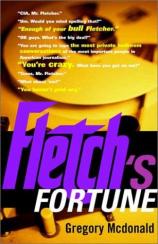Reading Group Guide
Discussion Questions
Fletch's Fortune

For discussion: Fletch's Fortune
1 When the I.R.S. man asks Fletch if there is a political motive behind his refusal to pay taxes, Fletch replies that his reasons are "purely esthetic" and claims to find the tax forms visually ugly, "very offensive," and their use of the English language "highly objectionable" [p. 203]. Is Fletch merely toying with the I.R.S. or is his answer in some way truthful? In what ways is it in character for him to be so sensitive to the esthetic nature of things? Is Fletch completely apolitical? Does he have some personal moral code that allows him to make decisions about right and wrong?
2. After questioning a convention full of journalists, the frustrated Captain Neale says, "I thought reporters were people who report the news. The last couple of days, I've gotten the impression they are the news" [p. 211]. In what ways can Fletch's Fortune be read as a satire? What characteristics of reporters are made to appear ridiculous or harmful in the novel? Which reporters are portrayed most satirically?
3. Early in the novel the narrator observes, "To a good reporter, everything was significant" [p. 63]. And after Fletch has solved the mystery of who killed Walter March, he says, "I always look for the controlling intelligence behind anything and everything" [p. 222]. How do these two principles guide Fletch in his investigation?
4. Much of Fletch's Fortune is concerned with blackmail. The C.I.A. blackmails Fletch into secretly gathering personal information on fellow journalists so that they too can be blackmailed, and the media patriarch Walter March employs a cadre of detectives to blackmail his employees and competitors. How is Fletch able to turn the tables on his blackmailers? In what ways does the novel, published in 1978, reflect the Watergate era's obsession with wiretapping and spying?
5. The anchorman Hy Litwack gives a speech about terrorism and television in which he argues that "Terrorism, like many another crime or insanity, is infectious. . . . One incident of terrorism causes two more incidents." Still, he maintains that "television did not create terrorism" [p. 71]. What is the relationship between terrorism and the media? How does reporting crime affect crime itself? How might Fletch characterize the reporter's role in society?
6. Fletch's Fortune is more comical than the first two novels in the Fletch series. What kinds of humor are present in the novel? What scenes or characters contribute most of that humor? How does this comic undercurrent affect the book as a whole?
For discussion of Fletch, Confess, Fletch, and Fletch's Fortune:
7. In what ways does Fletch's character evolve over the course of these three novels? How is he different in Fletch's Fortune than he is in Fletch? What traits remain constant in his character?
8. What methods of reasoning and investigation does Fletch employ in these novels to solve each crime? How does Mcdonald manage to keep the reader from knowing more than Fletch does? How surprising is the revelation at the end of each book?
9. Mcdonald has written, "The magic I attempt is to point the finger, as concisely as possible set the scene, then pull back my hand, disappear as the author, leave the reader alone with the characters."2 What is the effect of this kind of writing? Why is it especially useful in the mystery genre? Does this technique require more from the reader than other types of writing?
10. In addition to the narrative pull provided by the suspenseful investigation of a crime, Mcdonald's novels employ a narrative technique common to all great fiction: conflict. With whom or what is Fletch most often in conflict? How do these conflicts affect the reader's relationship both to Fletch and to the novels as a whole?
11. If you have read any of the work of Sir Arthur Conan Doyle, Raymond Chandler, and Dashiell Hammett, how does Fletch compare with other heroes such as Sherlock Holmes, Philip Marlowe, and Sam Spade? In what ways is he both like and unlike his predecessors? How has Mcdonald extended or put his own personal stamp on the mystery genre with the Fletch novels?
Fletch's Fortune
- Publication Date: March 12, 2002
- Paperback: 256 pages
- Publisher: Vintage
- ISBN-10: 0375713557
- ISBN-13: 9780375713552







